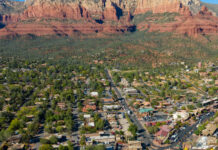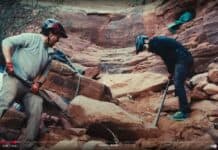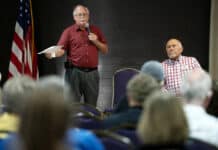A decision by the city of Sedona to allow a 1.5- million gallon water tank to be built in a residential area is being appealed in court.
Vincent McGeary, an attorney who lives on Cathedral Rock Trail, filed a complaint for special action in March with the Coconino County Superior Court. The case has not been heard nor has a date been set.
By the 4-1 vote in October, the Sedona Planning and Zoning Commission had approved a Conditional Use Permit request from Arizona Water Co for a water tank near the intersection of State Route 179 and Mallard Drive. An appeal can be made in writing within 15 days of the commission’s decision, which McGeary did.
By a unanimous vote in January, Sedona City Council voted to uphold planning and zoning’s decision, thus denying McGeary’s appeal.
Now, he is requesting the court nullify and void the CUP. When reached by email, McGeary said he did not want to comment on the litigation.
In his filing, McGeary states he will be impacted by the construction of the industrial facility, including but not limited to increased traffic, noise and dust caused by excavation and construction activities. In addition, he feels he will be impacted due to the elimination of residential buildable lots in the district in which the property is located and in the form of diminution in property value during the construction and thereafter.
He also alleges that city staff was biased in terms of their desire to see a water tank built in that area.
“Prior to Arizona Water Co.’s purchase of the property, the city desired the construction of a water storage and treatment facility on or near the property,” his court filing states. “On information and belief, prior to AWC’s purchase of the property, the director and [Community Development] Department knew of AWC’s plan to purchase the property for the purpose of building the plant. The department communicated to AWC its support of AWC’s plan to purchase the property and construct the plant and aided and abetted the AWC in its effort to secure the CUP.”
The commission purported to hold unbiased public hearings on or about Aug. 21, 2018, and Oct. 16, 2018, to evaluate the CUP application, he wrote. Upon information and belief, unknown to members of the public, one or more members of the commission knew of the city’s support for the project before conducting the public hearings, the lawsuit states.
He wrote that the council and commission failed to make the required findings of fact before denying the appeal and granting the CUP as required by city code.
“The council acted arbitrarily and capriciously in approving the actions of the commission despite the commission’s failure to make findings required by LDC,” McGeary wrote.
In regard to his use of “required findings,” he is referring to the Land Development Code. It states that the granting of the conditional use permit will not be materially detrimental to the public health, safety or welfare. The factors to be considered in evaluating this application shall include:
n Property damage or nuisance resulting from noise, smoke, odor, dust, vibration or illumination.
n Any hazard to persons and property from possible explosion, contamination, fire or flood.
n Any impact on surrounding area resulting from unusual volume or character of traffic.
n That the characteristics of the use as proposed and as may be conditioned are reasonably compatible with the types of use permitted in the surrounding area.
n That the proposed use, as it may be conditioned, will comply with the applicable provisions of this code and other ordinances.
n That the proposed expansion or change of a nonconforming use, if applicable, is no more deleterious to other properties in the surrounding area than the existing use.
“Defendants, in granting the CUP exceeded their jurisdiction, failed to perform a duty required by law as to which defendants had no discretion, acted without legal authority and acted arbitrarily and capriciously in violation of the Land Development Code of the city of Sedona,” the suit states.
It goes on to state, “The commission, the council and the department have acted outside their authority and jurisdiction in acting in concert with the AWC to identify the property, garner support for the project, solicit public approval for the project and otherwise act in concert with the applicant to further the project, thereby neglecting their duties to objectively and without bias apply the provisions of the LDC and the laws of Arizona in considering the CUP application.”
City Attorney Robert Pickels said the complaint alleges that the city failed to make requisite findings of fact in arriving at its decision to approve the conditional use permit for the water tank. Also, that city staff acted as an advocate for Arizona Water Co. in presenting the application to the Commission and Council for action.
“The city has denied that those allegations are true,” he said.
Pickels said both the commission and the council were presented with a comprehensive evaluation of the application and the staff opinion regarding the requisite findings of fact. Both took action to approve the application after having reviewed all of the information presented to them by staff and expressly stating that the application was deemed to be in compliance with all city codes.
“The standard on review will be whether the commission or council based their decision on something less than credible evidence,” he said.
In regard to the allegation that city staff acted as advocates for the Arizona Water Co., Pickels said it is staff’s responsibility to process land use applications, evaluate them and ensure that they are in proper form for presentation to the commission and council for a decision. That process necessarily involves frequent communication and interaction with an applicant.
“Professional planners have a duty to the community to ensure that intended land uses are appropriate and consistent with the city’s established plans for growth and development,” Pickels said.
Ron Eland can be reached at 282-7795, ext. 122 or by email at reland@larsonnewspapers.com





















